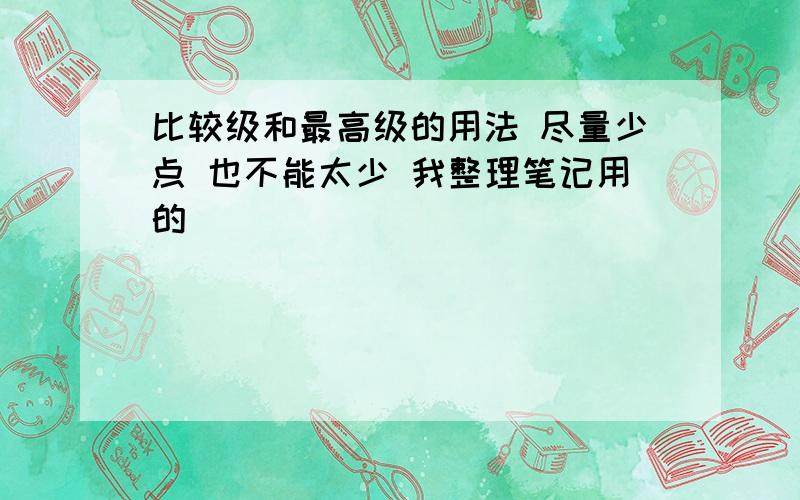比较级和最高级的用法 尽量少点 也不能太少 我整理笔记用的
来源:学生作业帮 编辑:神马作文网作业帮 分类:英语作业 时间:2024/10/04 13:28:05
比较级和最高级的用法 尽量少点 也不能太少 我整理笔记用的

形容词与副词的比较级
Objective(目的):
Learn the Grammar:
《The comparative degree & superlative degree of adjectives and adverbs.》
Procedure(步骤):
I. Listen to the tape and try to speak out the adjectives and adverbs
in the sentences.
1. Tom is bright.
2. It is fine today.
3. There was a heavy rain yesterday.
4. Zhang Hua is thin.
5. Listen to me carefully.
6. Tom speaks English well.
II. Ask two students to come to the front and compare heights and ages.
A is tall. B is taller. C is the tallest.
C is young. B is younger. A is the youngest.
III. Forms of adjectives and adverbs.
A. a. & adv. + er/est
1. a. & adv. +er/est
2. a. & adv. + r/st
3. a. & adv. 改 y 为 i + er/est
4. 双写 + er/est
B. more/most + a. & adv.
C. 不规则
many/much--more--most
old--older/elder--oldest/eldest
far--farther/further--farthest/furthest
ill/bad/badly--worse--worst
little--less--least
good/well--better--best
IV. Change the following original forms into comparative degrees
and Superlative degrees.
Slow --slower --slowest full--fuller--fullest
brave--braver --bravest wide--wider--widest
wet -- wetter --wettest sad--sadder--saddest
pretty--prettier--prettiest shy--shyer(shier)--shyest(shiest)
useful--more useful--most useful
expensive--more expensive--most expensive
V. Main points(要点).
1. 双音节词多数用more/most
eg. careful--more careful--most careful
famous--more famous--most famous
active--more active--most active
honest--more honest--most honest
unfair--more unfair--most unfair
ugly--more ugly--most ugly
2. 双音节词少数 + er/est
eg. clever--cleverer--cleverest
able--abler--ablest
3. 单音节形容词后加后缀ly构成的副词却是加more/most
eg. slowly--more slowly--most slowly
quickly--more quickly--most quickly
quietly--more quietly--most quietly
4. 双音节词前加un构成的三音节词+er/est
eg. unhappy--unhappier--unhappiest
unlucky--unluckier--unluckiest
5. 有些名词后+ly 构成形容词+er/est
eg. friendly--friendlier--friendliest
lovely--lovelier--lovelist
6. 有些双音节形容词即可加er/est又可用more/most
common--commoner--commonest
more/most common
likely stupid simple polite
handsome tired narrow often
gentle (温柔的) pleasant (宜人的)
7. 有些词没有比较级和最高级
top gray dead empty
round right wooden complete
8. 特殊情况
up--upper--uppermost late--later--latest(表时间)
late--later--last(表顺序)
VI. Usage
1. A > B
2. A = B
3. A < B
4. A > B, C...
VII. Questions.
1. than 的前面一定是比较级吗?
less + 原级 + than
He is less clever than his brother.
2. most前一定是用the吗?
She is___a___most beautiful girl.
She is__the__most beautiful gril in our class.
3. 比较级前一律不用冠词吗?
She is the taller of the two.
The earlier we start, the sooner we'll be back.
4. 修饰比较级只能用much,even,still,slightly,a lot, a little,
far, a great deal of吗?
倍数 年月 百分数
eg. Tom is three years older than Mike.
5. 两倍大,大两倍怎么表达
eg. Our school is twice as big as theirs.
Our school is twice bigger than theirs.
6. 含than 的句式都表示比较级吗?
eg. He is taller than anybody else in the class.
He is taller than any other student in the class.
7. as...as结构中间既有形容词又有名词时,顺序如何排列?
eg. 汤姆是个同他父亲一样好的老师.
Tom is as good a teacher as his father.
8. 表示“越来越”的意思时前后一定要一致吗?
eg. The smoke grew heavier and thicker.
9. 比较的对象前后一定要一致吗?
eg. It is warmer in winter in Shanghai than Beijing. x
It is warmer in winter in Shanghai than (it is) in Beijing.
10. 当比较的定语不同时能用it 和they吗?
eg. The climate of Shanghai is warmer in winter than that of Beijing.
The computers of our school are better than those of theirs.
Objective(目的):
Learn the Grammar:
《The comparative degree & superlative degree of adjectives and adverbs.》
Procedure(步骤):
I. Listen to the tape and try to speak out the adjectives and adverbs
in the sentences.
1. Tom is bright.
2. It is fine today.
3. There was a heavy rain yesterday.
4. Zhang Hua is thin.
5. Listen to me carefully.
6. Tom speaks English well.
II. Ask two students to come to the front and compare heights and ages.
A is tall. B is taller. C is the tallest.
C is young. B is younger. A is the youngest.
III. Forms of adjectives and adverbs.
A. a. & adv. + er/est
1. a. & adv. +er/est
2. a. & adv. + r/st
3. a. & adv. 改 y 为 i + er/est
4. 双写 + er/est
B. more/most + a. & adv.
C. 不规则
many/much--more--most
old--older/elder--oldest/eldest
far--farther/further--farthest/furthest
ill/bad/badly--worse--worst
little--less--least
good/well--better--best
IV. Change the following original forms into comparative degrees
and Superlative degrees.
Slow --slower --slowest full--fuller--fullest
brave--braver --bravest wide--wider--widest
wet -- wetter --wettest sad--sadder--saddest
pretty--prettier--prettiest shy--shyer(shier)--shyest(shiest)
useful--more useful--most useful
expensive--more expensive--most expensive
V. Main points(要点).
1. 双音节词多数用more/most
eg. careful--more careful--most careful
famous--more famous--most famous
active--more active--most active
honest--more honest--most honest
unfair--more unfair--most unfair
ugly--more ugly--most ugly
2. 双音节词少数 + er/est
eg. clever--cleverer--cleverest
able--abler--ablest
3. 单音节形容词后加后缀ly构成的副词却是加more/most
eg. slowly--more slowly--most slowly
quickly--more quickly--most quickly
quietly--more quietly--most quietly
4. 双音节词前加un构成的三音节词+er/est
eg. unhappy--unhappier--unhappiest
unlucky--unluckier--unluckiest
5. 有些名词后+ly 构成形容词+er/est
eg. friendly--friendlier--friendliest
lovely--lovelier--lovelist
6. 有些双音节形容词即可加er/est又可用more/most
common--commoner--commonest
more/most common
likely stupid simple polite
handsome tired narrow often
gentle (温柔的) pleasant (宜人的)
7. 有些词没有比较级和最高级
top gray dead empty
round right wooden complete
8. 特殊情况
up--upper--uppermost late--later--latest(表时间)
late--later--last(表顺序)
VI. Usage
1. A > B
2. A = B
3. A < B
4. A > B, C...
VII. Questions.
1. than 的前面一定是比较级吗?
less + 原级 + than
He is less clever than his brother.
2. most前一定是用the吗?
She is___a___most beautiful girl.
She is__the__most beautiful gril in our class.
3. 比较级前一律不用冠词吗?
She is the taller of the two.
The earlier we start, the sooner we'll be back.
4. 修饰比较级只能用much,even,still,slightly,a lot, a little,
far, a great deal of吗?
倍数 年月 百分数
eg. Tom is three years older than Mike.
5. 两倍大,大两倍怎么表达
eg. Our school is twice as big as theirs.
Our school is twice bigger than theirs.
6. 含than 的句式都表示比较级吗?
eg. He is taller than anybody else in the class.
He is taller than any other student in the class.
7. as...as结构中间既有形容词又有名词时,顺序如何排列?
eg. 汤姆是个同他父亲一样好的老师.
Tom is as good a teacher as his father.
8. 表示“越来越”的意思时前后一定要一致吗?
eg. The smoke grew heavier and thicker.
9. 比较的对象前后一定要一致吗?
eg. It is warmer in winter in Shanghai than Beijing. x
It is warmer in winter in Shanghai than (it is) in Beijing.
10. 当比较的定语不同时能用it 和they吗?
eg. The climate of Shanghai is warmer in winter than that of Beijing.
The computers of our school are better than those of theirs.